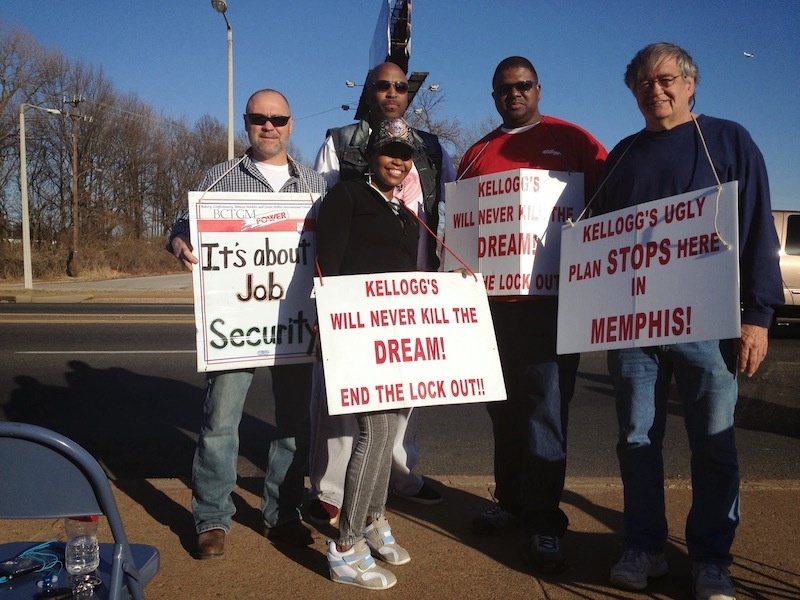Locked-out Kellogg worker in Memphis: Company leaders 'don't care about our families'

By Joe Atkins, Labor South
Robert McGowen, a 23-year-veteran at the Kellogg plant in Memphis, Tenn., waved to another passing carload of people beeping their support of the protest taking place on Airways Boulevard.
"I'm totally amazed at what Memphis has done," said McGowen, who worked in Kellogg's packing department until last October, when he and more than 200 others workers were locked out by the company over a labor contract dispute. "They've been supplying us with food. The whole community has been supportive."
Carrying a sign proclaiming "It's about Job Security," McGowen and a handful of other workers stood in front of the plant Saturday continuing a protest that has been ongoing since the Oct. 22 lockout, four long months that have included subfreezing temperatures, hard rains, and dwindling family budgets since the company stopped medical, vision and dental benefits.
Locked-out worker Steve Lamar, an electrician with 27 years of experience at Kellogg, said his wife recently suffered a brain aneurysm that he blames on stress from Kellogg's actions. "They’re hurting our families," he said. "They don't care about our families."
Community support has included a call by political and religious leaders in Memphis for a full-scale national boycott of Kellogg products until the lockout ends. Backing the workers and the boycott are organizations such as the Southern Christian Leadership Conference and the Congress of Racial Equality. An online petition on behalf of the workers has gained thousands of signatures.
An estimated 60 percent of the 226 locked-out workers are black.
The Battle Creek, Mich.-based cereal-making giant's CEO and president, John Bryant, gets much of the blame. Bryant took over leadership of the company in 2011. McGowen and other members of the Bakery, Confectionary, Tobacco Workers and Grain Millers union said they always got along well with Kellogg management until Bryant's take-no-prisoners approach to union negotiations.
The union refused to approve a company plan to cut wages and benefits as well as hire new "casual" workers at lower pay. The lockout focused on Memphis because the company's contract agreement with workers there expired in October. The lockout does not extend to the Kellogg plant in Rossville, Tenn.
McGowen said the contract disagreement was about fundamental "master issues" that the union local simply couldn't concede.
The workers say production of Frosted Flakes, Corn Flakes, and Froot Loops has dropped to less than half. Still, the company has brought in scabs to replace the workers, and it insists that production is keeping pace with consumer demand.
Kellogg reported a profit margin of nearly 24 percent for the quarter ending Dec. 31, 2013, more than double the profit margin of the previous quarter. In an earlier report, it showed profits totaling $352 million for the quarter ending last June, up $28 million from the same period the previous year. CEO Bryant's salary is roughly $6.6 million a year.
Tags
Joe Atkins
Joe Atkins is a professor of journalism at the University of Mississippi and author of "Covering for the Bosses: Labor and the Southern Press." A veteran journalist, Atkins previously worked as the congressional correspondent with Gannett New Service's Washington bureau and with newspapers in North Carolina and Mississippi.
